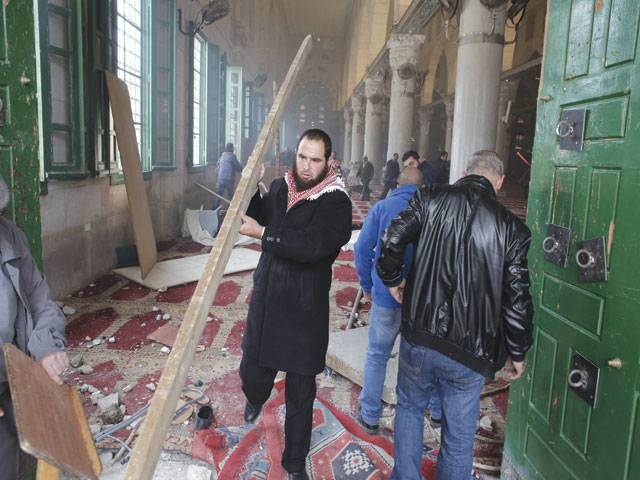JERUSALEM - Israeli police clashed with stone-throwing Palestinians inside Jerusalem’s flashpoint Al-Aqsa mosque compound Wednesday after Jewish nationalists announced plans to visit the site despite weeks of soaring tensions.
It has been the scene of frequent confrontations in recent months, largely triggered by Palestinian fears that Israel was poised to allow Jewish prayer at the site.
The latest clashes erupted after a group of hardline Jewish nationalists said they were planning to visit the plaza a week after the attempted murder of one of their leaders by a Palestinian gunman.
“Dozens of masked protesters threw stones and firecrackers at security forces who then entered the Temple Mount and pushed the demonstrators inside the (Al-Aqsa) mosque,” police spokeswoman Luba Samri said, using the Israeli term for the compound.
Jordan recalled its ambassador to Israel on Wednesday after police clashed with stone-throwing Palestinians inside the flashpoint Al-Aqsa mosque compound in Jerusalem, official media said.
Prime Minister Abdullah Nsur asked the foreign minister to “recall the Jordanian ambassador from Tel Aviv in protest at Israel’s escalation on the Al-Aqsa mosque compound,” the Petra news agency reported.
Meanwhile, an Israeli border policeman was killed and nine other people wounded Wednesday when a Palestinian ran down two groups of pedestrians in Jerusalem following weeks of tensions in the city.
It was the second such deadly car attack by a Palestinian in two weeks. Police described the incident, which took place on the seam line between west Jerusalem and the city’s annexed Arab east, as a “hit and run terror attack.” The driver, whom police identified as a Palestinian from Shuafat refugee camp in east Jerusalem, hit two groups of pedestrians before getting out of the vehicle and attacking passers-by with an iron bar. Police then shot him dead. The attack mirrored an incident on October 23 when a Palestinian rammed his car into a group of pedestrians, killing a young woman and a baby. That incident took place on the same road, just a few hundred metres (yards) further north.
Police spokeswoman Luba Samri said the driver had first struck a group of policemen who were crossing the road near border police headquarters, before continuing south and hitting a group of pedestrians waiting at the Shimon HaTsadik light rail station.
After the car came to a halt, the driver, who had sustained injuries during his rampage, “got out of the vehicle and started to hit people with an iron bar,” she said. He was shot dead by police out on patrol in the area.
An AFP correspondent also reported seeing police on the roof of the mosque. Police said the protesters had stayed in the mosque overnight to try to prevent the visit by Jewish hardliners, and had started hurling stones and firecrackers when police opened the entrance used by non-Muslims. Police often lock protesters in the mosque when clashes erupt at the site. Clashes also spread into the alleys of the surrounding Old City, an AFP correspondent reported.
Israeli police fired tear gas and percussion grenades to disperse a large crowd of angry Palestinians. Dozens of children on their way to school were caught up in disturbances.
Amin Abu Ghazali of the Palestinian Red Crescent told AFP that 39 people were wounded, 11 of whom were taken to hospital with injuries from foam-coated rubber bullets. Six of them were in serious condition, he said.
After the protesters were locked inside, the compound was reopened to visitors with around 108 Israeli Jews entering alongside 200 foreign tourists, police said.
The planned visit by the Jewish group, including ultra-nationalist politicians, was scheduled to take place a week after the attempted assassination of Rabbi Yehuda Glick, one of its leading activists, by a Palestinian gunman.
“We won’t let terror win, we are going up to the Temple Mount to mark a week since the assassination attempt,” said a flyer advertising the visit.
Meanwhile, EU foreign affairs chief Federica Mogherini on Wednesday condemned Israel’s plans to build another 500 settler homes in annexed East Jerusalem, ahead of her first visit to the Jewish state later this week.
Going ahead with the new settler homes risks undermining efforts to get the Middle East peace process back on track, Mogherini said.
The European Union was leading efforts to get the talks restarted “but this decision represents yet another highly detrimental step which undermines the prospects for a two-state solution,” she said in a statement.
It “seriously calls into question Israel’s commitment to a peaceful negotiated settlement with the Palestinians,” she added.
Voicing a sense of exasperation, Mogherini said that since previous pleas “have gone unheard, I call on the Israeli authorities to reverse (the plans) and put an end to its settlement policy in East Jerusalem and in the West Bank.”
Friday, April 19, 2024
Heavy clashes at Al-Aqsa mosque compound
Jordan recalls envoy to Israel over clashes | Jerusalem policeman killed as Palestinian rams car into crowd

8:27 AM | April 19, 2024
8:09 AM | April 19, 2024
Minister advocates for IT growth with public-private collaboration
9:57 PM | April 19, 2024
Formula 1 returns to China for Round 5
9:05 PM | April 19, 2024
Germany head coach Julian Nagelsmann extends contract till 2026 World Cup
9:00 PM | April 19, 2024
IMF urges Italy, France to spend less, Germany to loosen purse strings
8:57 PM | April 19, 2024
Empowering Women: The Vision of Maryam Nawaz Sharif
8:37 PM | April 19, 2024
A Tense Neighbourhood
April 19, 2024
Dubai Underwater
April 19, 2024
X Debate Continues
April 19, 2024
Hepatitis Challenge
April 18, 2024
IMF Predictions
April 18, 2024
Kite tragedy
April 19, 2024
Discipline dilemma
April 19, 2024
Urgent plea
April 19, 2024
Justice denied
April 18, 2024
AI dilemmas unveiled
April 18, 2024
ePaper - Nawaiwaqt
Advertisement
Nawaiwaqt Group | Copyright © 2024





